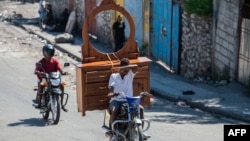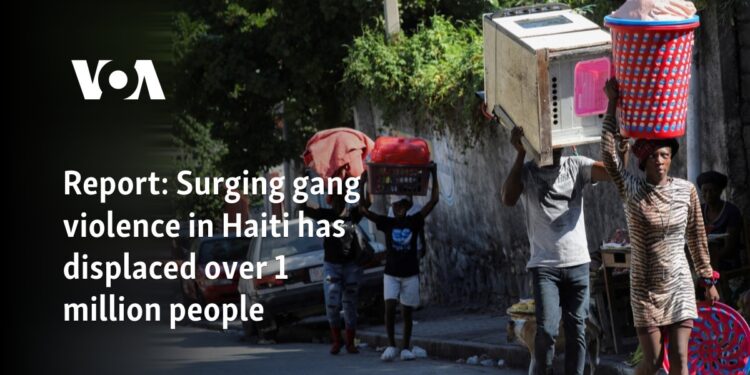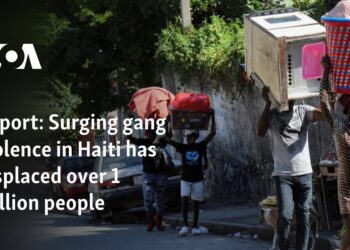GENEVA —
Gang violence in Haiti has displaced more than a million people, including children, who make up more than half of the displaced population and “bear the greatest burden of displacement,” according to a report released Tuesday by the International Organization for Migration.
“It is important to note that at this moment, Haiti is facing the largest number of internal displacements as a result of the gang violence ever [recorded] in history,” IOM spokesman Kennedy Okoth Omondi told journalists at a briefing Tuesday in Geneva.
“In December 2023, we recorded around 315,000 people who were displaced from the violence. One year since then, we have seen the number triple to over a million people who have been displaced because of gang violence in Haiti.
“This is a really troubling number, and it represents the security situation that most Haitians are currently facing,” he said, adding that most of the people have been displaced multiple times.
“We have seen a lot of the displacement occurring within the capital, Port au Prince, and we also have seen a lot of people being displaced and moving towards the neighboring provinces … living with families, communities and friends who already are facing their own economic challenges,” further straining the limited resources of communities struggling to survive, Okoth Omondi said.
FILE – Residents of the Nazon neighborhood displaced by gang violence construct a tent encampment, in Port-au-Prince, Haiti, Nov. 15, 2024.
Compounding this displacement is a growing deportation crisis. IOM reports that last year, some 200,000 Haitians, most of whom had taken refuge in neighboring Dominican Republic, had been forcibly deported to Haiti.
Okoth Omondi declined to speak specifically about the deportation policies of other countries. He also would not comment about concerns arising from possible changes to the U.S. policy of granting Temporary Protected Status to asylum-seekers fleeing conflict and violence under the incoming Trump administration.
However, he said, “Deportations or forced returns to countries that already are facing mounting security and humanitarian challenges are not something that is going to be beneficial.”
Both President-elect Donald Trump and Vice President-elect JD Vance have suggested that “they would scale back” this policy as they pursue a policy of mass deportations of illegal immigrants.
Last week, the U.N. Human Rights Office reported that in 2024 at least 5,601 people were killed, more than 2,200 people were injured and 1,494 were kidnapped as a result of gang violence in Haiti.
“These figures alone cannot capture the absolute horrors being perpetrated in Haiti, but they show the unremitting violence to which people are being subjected,” said Volker Türk, U.N. high commissioner for human rights.
“The acute insecurity and resulting human rights crisis in the country simply do not allow for the safe, dignified and sustainable return of Haitians. And yet, deportations are continuing,” Türk said.
Underscoring this situation, IOM Director-General Amy Pope said Haiti needs sustained humanitarian assistance to save and protect lives.
“We must work together to address the root causes of the violence and instability that have led to so much death and destruction,” she said.

FILE – People flee their neighborhood after armed gangs terrorized the Delmas 24 and Solino areas in Port-au-Prince, Haiti, Oct. 26, 2024.
As displacement has grown, so has the number of sites sheltering them. Over the past year, IOM reports that the number of displacement sites has increased from 73 to 108. It says the sites are severely overcrowded and lack adequate access to essential services such as food, clean water, sanitation and education.
“Access remains one of the biggest challenges,” Okoth Omondi said. “As the violence surges, it becomes more and more difficult to access those who basically need humanitarian aid. The need for humanitarian assistance and long-term investment in governance, security and social cohesion are essential.”
U.N. officials say Haiti’s appeals for international support are falling on deaf ears. The United Nations reports that only 42.5% of the $673.8 million Haiti Humanitarian Response Plan has been funded.
Besides money, Haiti desperately needs security, a situation that remains elusive.
“The number of people who are being displaced is a clear indication of the surge of violence,” Okoth Omondi said. “So, we basically need more support for multilateral forces to ensure that we have peace and stability to the country and to the Haitians who desperately need this.”
Alessandra Vellucci, director of the U.N. Information Service in Geneva, told journalists that a Multinational Security Support Mission in Haiti, composed of some 750 security personnel from the Bahamas, Belize, El Salvador, Guatemala, Jamaica and Kenya, has been deployed to the impoverished Caribbean country.
“Kenya, who is the mission lead, has indicated it intends to deploy an additional 600 police officers,” Vellucci said, adding that “this is out of 2,500 personnel initially planned.”
“So, we really need them to step this up in order for the mission to demonstrate its full potential,” she said, stressing that the trust fund to support this mission is “currently severely underfunded.”
“We need to break the cycles of violence and the displacement,” Okoth Omondi said. “We need to foster stability in communities towards restoring hope and recovery to the people of Haiti.”
Source link : http://www.bing.com/news/apiclick.aspx?ref=FexRss&aid=&tid=6786d9d602e64f7f8d536597a5d359b5&url=https%3A%2F%2Fwww.voanews.com%2Fa%2Fun-more-than-one-million-people-internally-displaced-in-haiti%2F7936052.html&c=7161242711647853814&mkt=en-us
Author :
Publish date : 2025-01-13 21:19:00
Copyright for syndicated content belongs to the linked Source.





